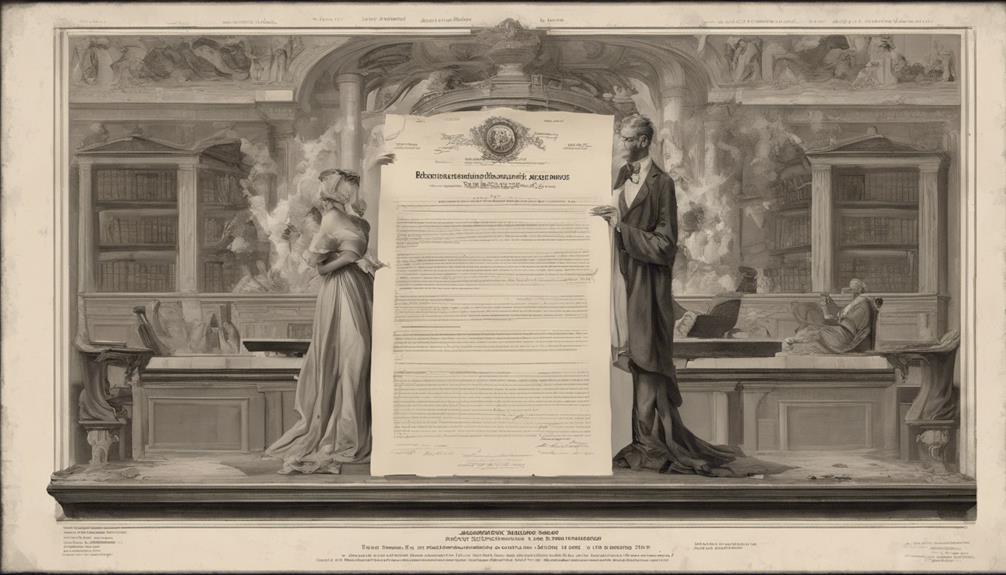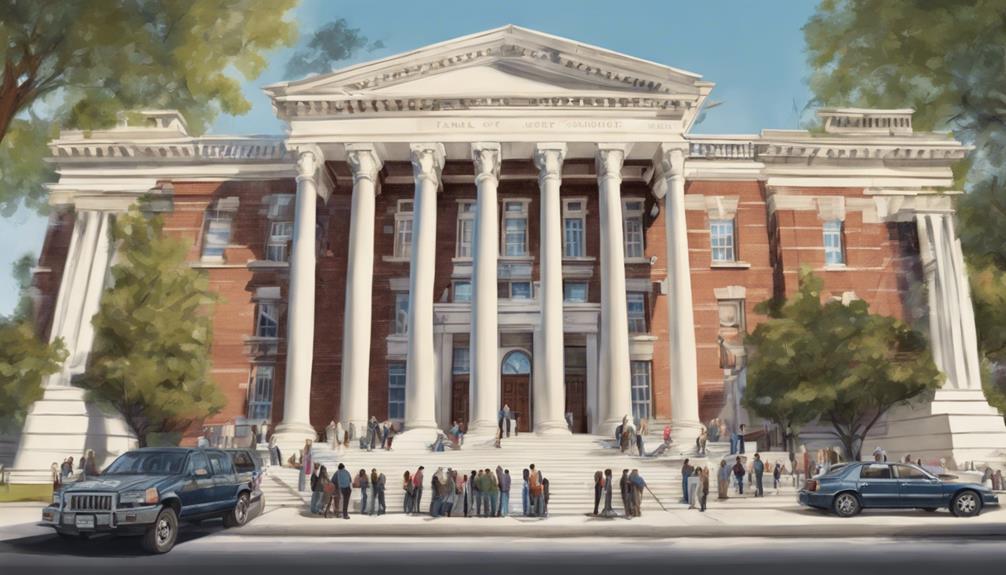When my friend decided to start the process of getting a divorce in Alabama, she was surprised by how complicated it was. From meeting residency requirements to finalizing the divorce decree, every step demanded careful attention and understanding.
As we navigated through the initial stages, we realized the importance of gathering relevant documentation and seeking legal guidance to ensure a smooth and efficient divorce process. The complexities of Alabama's divorce laws can be daunting, but with the right approach and knowledge, individuals can successfully navigate the 7 steps towards obtaining a divorce in the state.
Key Takeaways
- Establish Alabama residency for 6 months before filing.
- Determine fault-based or no-fault grounds for divorce.
- Serve divorce papers accurately following legal requirements.
- Obtain court approval, file final paperwork, and preserve documents for final divorce decree.
Residency and Filing Requirements
When considering a divorce in Alabama, it's essential to understand the residency requirements outlined in the Alabama legal codes to ensure a smooth legal process. Alabama law mandates that the plaintiff must have been a resident of the state for at least six months, especially if the defendant resides out-of-state, as per Ala. Code § 30-2-5. This residency requirement is crucial before initiating the divorce proceedings.
Understanding the grounds for divorce is equally important. Alabama recognizes both fault-based and no-fault grounds for divorce, including fault-based grounds such as cruelty, adultery, or substance abuse, and the no-fault option of an irretrievable breakdown of the marriage, governed by Ala. Code § 30-2-1. Knowing these requirements helps in determining the proper jurisdiction for filing and the type of divorce to pursue.
Determining Grounds for Divorce

To proceed with the divorce process effectively in Alabama, it's essential to understand the various grounds recognized by the state for ending a marriage. Alabama allows for both fault-based and no-fault grounds for divorce. Fault-based grounds such as adultery and abandonment exist alongside no-fault grounds like irretrievable breakdown of the marriage. Specific grounds for divorce in Alabama include impotency, imprisonment, addiction, and domestic violence. These grounds are crucial as they form the legal basis for the dissolution of marriage in Alabama.
When filing for divorce in Alabama, it's necessary to clearly state the grounds on which the marriage is being dissolved. Consulting with a divorce lawyer can provide valuable insight into determining the most appropriate grounds for divorce based on the specific circumstances of the marriage. Understanding the grounds for divorce is a fundamental step in initiating the process of ending a marriage in Alabama.
Serving Divorce Papers
When serving divorce papers in Alabama, we must ensure that the legal service requirements are met accurately. Understanding the various delivery methods and timing constraints is essential to proceed efficiently.
Proper communication and adherence to these guidelines can help navigate this part of the divorce process smoothly.
Legal Service Requirements
Understanding the legal service requirements for serving divorce papers in Alabama is crucial to ensure the proper initiation of the divorce process. When serving divorce papers, it's essential to comply with Alabama laws to maintain the validity of the legal proceedings. Here are some key points to keep in mind:
- Divorce papers must be served to the other party to start the legal process.
- Various methods can be used, such as the sheriff's office or private process servers.
- Alternative methods like certified mail with return receipt or newspaper notice can be utilized if the spouse's whereabouts are unknown.
- Proper service guarantees that the other party receives notice of the divorce proceedings.
Delivery Methods and Timing
Exploring the various delivery methods and timing for serving divorce papers in Alabama is crucial for ensuring a smooth initiation of the legal process. Divorce papers must be served to the spouse by a non-party adult within 120 days of filing. Common methods include using a private process server or the sheriff's office. Additionally, service can be achieved through certified mail with return receipt requested. In cases where the spouse's whereabouts are unknown, service by publication in a newspaper may be permitted with court approval. Ensuring proper and timely service of divorce papers is essential to move legal proceedings forward effectively.
| Methods | Serving Divorce Papers in Alabama |
|---|---|
| Private Process Server | Efficient and professional service |
| Sheriff's Office | Official and reliable delivery |
| Certified Mail | Trackable and secure option |
Contested Vs. Uncontested Divorce

In divorces in Alabama, whether contested or uncontested, the level of agreement between spouses on crucial issues significantly impacts the overall process and outcome. Here are some key points to consider:
- Uncontested Divorce: This type of divorce occurs when both parties agree on all aspects, such as property division, alimony, and child custody, without the need for court intervention.
- Contested Divorce: In contrast, a contested divorce involves disagreements between spouses on critical matters, leading to more court hearings, legal fees, and time-consuming procedures.
- Mediation: Uncontested divorces often involve mediation to facilitate agreements, making the dissolution process smoother and less confrontational.
- Outcome Differences: Uncontested divorces in Alabama can be finalized more swiftly, with less conflict, compared to contested divorces, offering a more amicable resolution for all parties involved.
Court Proceedings and Hearings

Navigating the court proceedings and hearings in an Alabama divorce can be a complex and pivotal aspect of the overall process. The court proceedings typically involve multiple hearings to address various critical issues such as marital asset division, child custody, support obligations, and alimony.
The discovery phase plays a crucial role in uncovering hidden assets, income, and other pertinent information that can influence the final decisions made during the hearings.
During court proceedings, negotiating a comprehensive divorce settlement outside of court can help avoid lengthy legal battles. Once a settlement is reached, it must be submitted to the court for approval, marking a significant step towards finalizing the divorce.
This approval process ensures that the terms of the settlement align with legal requirements and protect the rights of both parties involved. Successfully navigating these court proceedings and hearings is essential for achieving a fair and satisfactory resolution in an Alabama divorce.
Mediation and Settlement

Engaging in mediation during an Alabama divorce can be a constructive and cost-effective approach to resolving issues such as child custody and property division. Mediation offers a platform for both parties to communicate their needs and concerns with the assistance of a neutral third party mediator. Here are some key points to consider about mediation and settlement agreements in the divorce process:
- Efficient Resolution: Mediation can save time and money by avoiding lengthy court battles and providing more control over the final outcome.
- Comprehensive Agreements: Settlement agreements cover essential aspects like alimony, child support, visitation schedules, ensuring that both parties are clear on their responsibilities.
- Legal Approval: Court approval of settlement agreements is crucial for finalizing the divorce process and ensuring the terms are legally enforceable.
- Neutral Mediators: Mediators facilitate discussions between spouses, guiding them towards mutually acceptable resolutions and fostering effective communication.
Finalizing the Divorce Process

Once the divorce settlement agreement is in place, the next crucial step is to seek court approval. This involves a final hearing where the agreement is reviewed, and a divorce decree is issued.
Following approval, the parties must sign the decree and file the necessary paperwork to formalize the divorce.
Court Approval Required
To finalize the divorce process in Alabama, obtaining court approval is a crucial step that officially ends the marriage and involves the court's review and approval of the settlement agreement.
Here are some key points to consider during the court approval process:
- Submission of Required Documents: Ensure all necessary documents are submitted to the court for review.
- Review of the Divorce Settlement Agreement: The court carefully examines the agreement to ensure it meets legal requirements.
- Official Marriage Dissolution: Court approval signifies the official end of the marriage in Alabama.
- Issuance of Divorce Decree: Following approval, a divorce decree is issued, outlining the terms of the divorce for both parties to adhere to.
Sign Divorce Decree
After obtaining court approval for the divorce settlement agreement, the next crucial step in finalizing the divorce process in Alabama is signing the divorce decree to officially terminate the marriage.
The divorce decree is a final court order that encompasses important details such as property division, child custody, and support arrangements. Both parties must carefully review and sign the divorce decree, indicating their understanding and agreement with the terms outlined.
Once both parties have signed, the divorce decree is filed with the court for approval. Upon approval by the court, the divorce decree becomes effective, formally bringing an end to the marriage.
It's essential to ensure that all aspects of the divorce decree are accurate and acceptable to both parties before signing and filing it with the court.
File Final Paperwork
When preparing to file final paperwork to complete the divorce process in Alabama, it's crucial to ensure that all necessary forms are accurately filled out and signed by both parties before submission to the court for approval.
Here are some key steps to consider:
- Submit the final paperwork, including the divorce decree and settlement agreement, to the court for approval.
- Ensure all required forms are completed accurately and signed by both parties before filing.
- The court will review the paperwork to ensure compliance with Alabama laws and the terms of the agreement.
- Once approved, the court will issue the final divorce decree officially ending the marriage.
Remember to keep copies of all final paperwork and court orders for your records and future reference.
Frequently Asked Questions
How Quickly Can You Get Divorce in Alabama?
We can typically finalize an uncontested divorce in Alabama in about a month. Factors like court workload and agreement on terms influence speed. Contested divorces may take over a year. The 30-day waiting period is mandatory.
Do You Have to Be Separated for a Year to Get a Divorce in Alabama?
No, in Alabama, there isn't a mandatory one-year separation requirement to get a divorce. Grounds for divorce can include fault-based or no-fault reasons. This means you can file for divorce without waiting for a year of separation.
How Much Does It Cost to Get a Divorce in Alabama?
Getting a divorce in Alabama typically costs between $200 to $300 for filing fees, not including additional expenses like serving papers and legal representation. The total cost can vary based on court involvement and case complexity.
Can You Get a Divorce Without the Other Person Signing in Alabama?
Yes, we can get a divorce without the other person signing in Alabama if they are properly served with divorce papers and choose not to respond. The legal process can proceed to a default judgment in such cases.
Conclusion
In conclusion, navigating the divorce process in Alabama involves understanding residency requirements, determining grounds for divorce, serving papers, handling contested or uncontested cases, attending court proceedings, considering mediation, and finalizing the process.
By following these 7 steps with patience and diligence, individuals can effectively navigate the complexities of divorce proceedings in Alabama.
Remember, seeking legal assistance can provide guidance and support throughout this challenging time. Stay informed, stay strong, and remember, you aren't alone in this journey.










